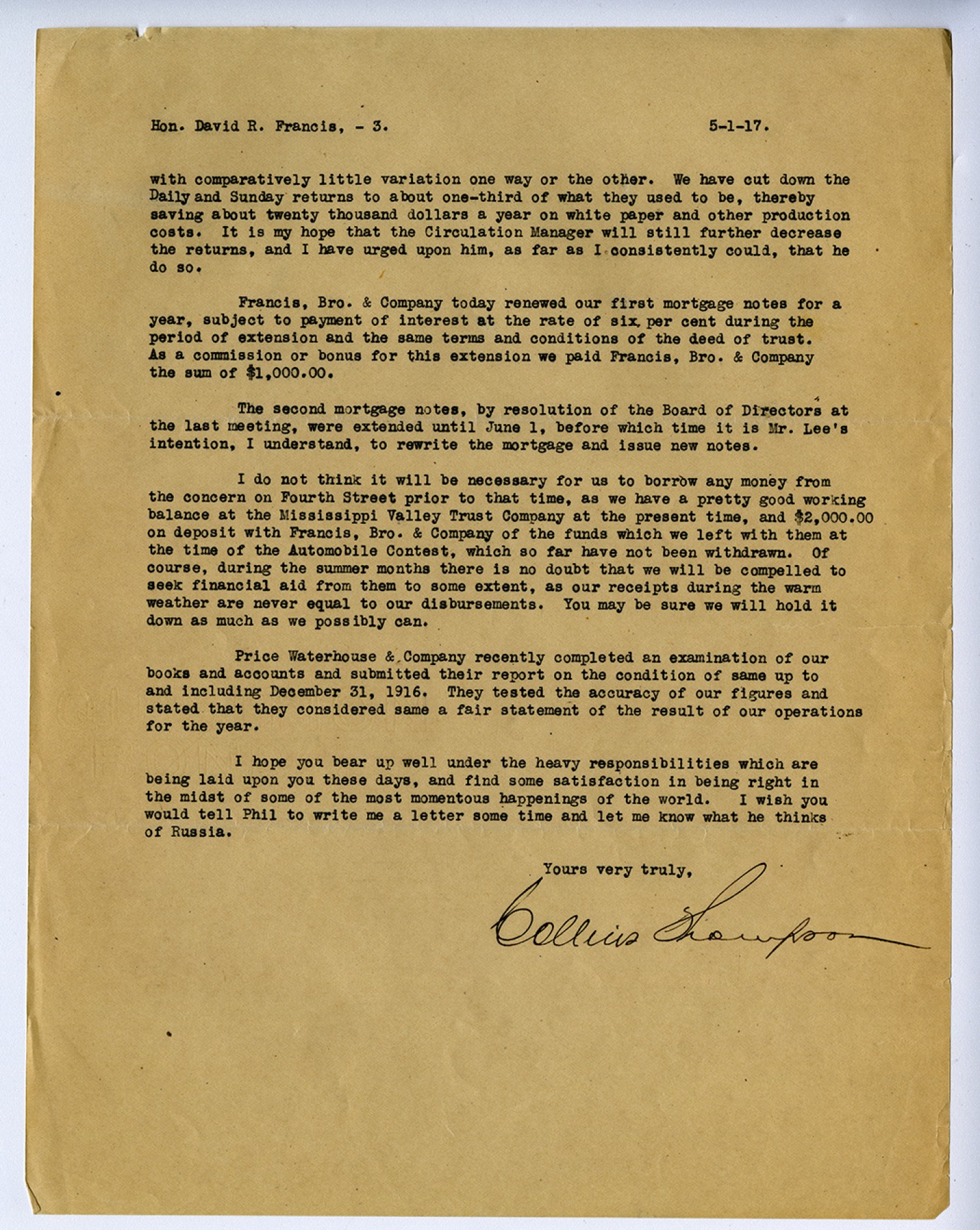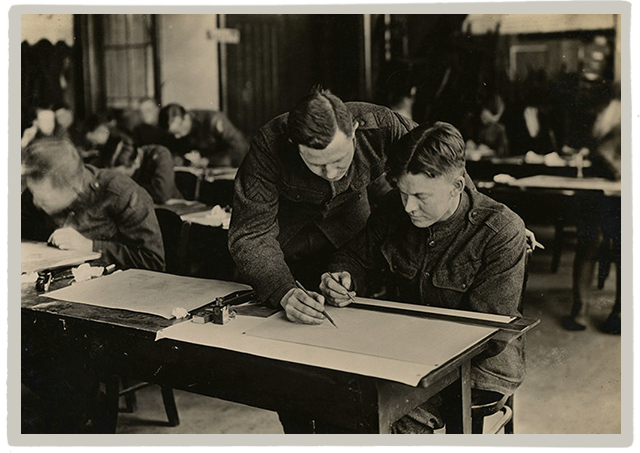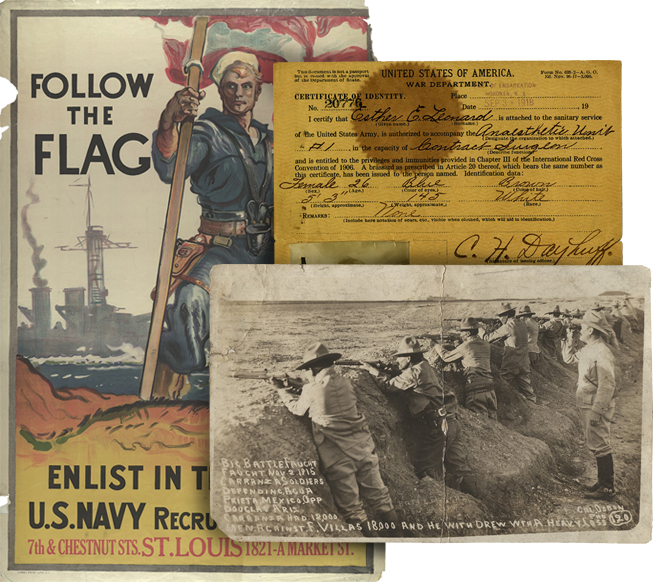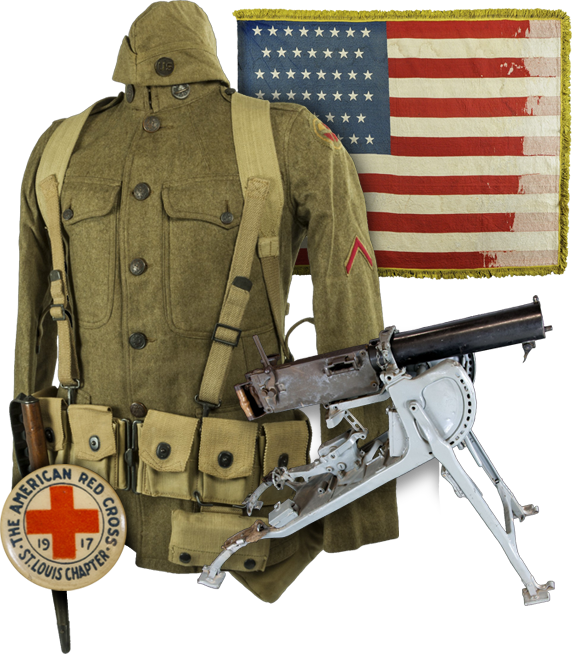Collins Thompson letter to David R. Francis - May 1, 1917

Transcript
No. 11. [The St. Louis Republic letterhead] St. Louis, May 1, 1917. Hon. David R. Francis, Ambassador to Russia, Petrograd. Dear Governor:- I imagine these must be busy times for you. We see a good deal printed in the papers of this country about Russia, but nothing to absolutely satisfy us as to the real situation which prevails there. Your dispatch to the State Department that all Russia needed to do her share towards beating Germany was munitions, railroad supplies and the credit which the United States can furnish her has been widely and favorably commented upon as a frank expression of the situation. It is hard for us to realize over her that such a drastic change could take place in Russia as the recent revolution has produced and in talking with our friends we find a widespread feeling of doubt whether Russia can continue to fight off the German host until the necessary aid reaches her. Your friends here seem to feel that although the post at the Court of St. James is usually considered the first one in the Diplomatic Service, as things have turned out you were fortunate in your appointment as Ambassador to the Russian government, which seems to involve more important negotiations than any other mission from this country is called to perform. There are some visible evidences of preparation by our own government for the war, although so far, at least in this part of the country, no great change in the usual order of things has taken place. There is general satisfaction over the assurance that the conscription act will soon become a law. The Republic, in fact all of the St. Louis papers with the exception of the Times, strongly supported this method of raising our army. There has been no trouble in and around St. Louis as yet, but precautions are being taken to guard against any disorder. We in Kirkwood have organized a company of Home Guards, in which about a hundred and twenty-five of us have enrolled, and are drilling two or three hours every week. We are making arrangements to procure uniforms and guns, so that we may be ready for whatever service is demanded of us, most likely guard duty or something of that sort in the event the regular army or militia regiments are withdrawn from St. Louis and the county. My brother George has made an application for the Officers Reserve Corps, which is in training at Fort Riley, Kansas. He is twenty-seven years old and unmarried, and feels like it is his duty to respond to the country
Description
Collins Thompson sent this letter to the Honorable David R. Francis of the St. Louis Republic about the Russian Revolution and Russia's role in World War I. Thompson discussed how the war has impacted his business. David Rowland Francis came to St. Louis in 1866. He served as mayor of St. Louis from 1885 to 1889 and governor of Missouri from 1889-1893. Francis was also the American Ambassador to Russia during World War I.

Transcript
Hon. David R. Francis, - [page 2] [May 5, 1917] as far as possible and fill only as many places as are absolutely necessary. The men are being given the assurance that they are considered as being on leave of absence and their places will be restored to them as soon as they are mustered out. We have also discussed what we ought to do in the way of payment to them while they are away, but have reached no definite conclusion. We shall probably not be able to deal as generously with them as we should like, by reason of the fact that our expenses will be abnormally heavy during the war. Perry and Lilley were in New York last week in attendance upon the annual meeting of the Associated Press and the American Newspaper Publishers Association. While there they looked into the white paper situation, as our contract expires on the 30th of June, having been made for a period of six months. Mr. Bothwell, Manager of the mill which is at present supplying us, intimated that they expected to charge us a higher price on the new contract than we are now paying, but did not name a definite figure. Penny and Lilley were unable to do anything with any other mill, and we shall probably have to abide by whatever decision the Brompton people make. By careful economy we have succeeded in building up a reserve stock of abour four hundred tons, which we have either in the warehouse in the St. Louis or in transit. Our shipments are coming through with greater regularity and expedition than they were a couple of months ago, but I am continually in fear that the railroads will be compelled to sidetrack shipments of paper for those of other material on the orders of the governmental authorities. I am therefore very anxious to get as much paper into the St. Louis warehouse as possible. While unable to give you definite figures as to results of our business for the month of April, I surmise that they will not be quite as favorable as we had hoped, for the reason that our advertising revenue will probably not exceed that of April 1916. For the month of March we made a profit of $34.00, as against a loss for March 1916 of approximately $4,000.00. The loss for April 1916 was $600.00. I have considerable doubt that we will, under the circumstances, break even for April 1917, but we may possibly do so. The mail order business such as we ordinarily handle in the Semi-Weekly Republic and Farm Progress is considerably demoralized and the volume of advertising in both of those publications is light, thus making an unfavorable showing for them. The Post Office Department of the government has recently made a ruling which will very seriously effect the circulation of most, if not all of the farm publications. It is to the effect that the government will not recognize as legitimate circulation any orders taken from subscribers at less than fifty per cent of the advertised price of the paper. Many farm magazines have been in the past asking only a few cents for yearly subscriptions, and some of them have actually taken thousands of orders in clubbing arrangements with other agricultural publications at no price at all, permitting the parties who took the subscriptions to ask what they wanted for them and to keep all the money they got. In the long run I think this ruling will work out favorably to Farm Progress as we only at one time engaged in a practice of this sort, for a period of three of four months, when the circulation of Farm Progress ran desperately low, as you may recall, and extreme measures were required to quickly rebuild it. On the other hand, it has been the constant practice of many of our competitors to secure their subscriptions in this manner, and they have thereby been able to make an impressive showing to their customers as to the volume of advertising which they have. The circulation on the Daily and Sunday is about holding its own,
Description
Collins Thompson sent this letter to the Honorable David R. Francis of the St. Louis Republic about the Russian Revolution and Russia's role in World War I. Thompson discussed how the war has impacted his business. David Rowland Francis came to St. Louis in 1866. He served as mayor of St. Louis from 1885 to 1889 and governor of Missouri from 1889-1893. Francis was also the American Ambassador to Russia during World War I.

Transcript
Hon. David R. Francis, - [page 3] [ May 5, 1917]. with comparatively little variation one way or the other. We have cut down the Daily and Sunday returns to about one-third of what they used to be, thereby saving about twenty thousand dollars a year on white paper and other production costs. It is my hope that the Circulation Manager will still further decrease the returns, and I have urged upon him, as far as I consistently could, that he do so. Francis, Bro. & Company today renewed our first mortgage notes for a year, subject to payment of interest at the rate of six per cent during the period of extension and the same terms and conditions of the deed of trust. As a commission or bonus for this extension we paid Francis, Bro. & Company the sum of $1,000.00. The second mortgage notes, by resolution of the Board of Directors at the last meeting, were extended until June 1, before which time it is Mr. Lee
Description
Collins Thompson sent this letter to the Honorable David R. Francis of the St. Louis Republic about the Russian Revolution and Russia's role in World War I. Thompson discussed how the war has impacted his business. David Rowland Francis came to St. Louis in 1866. He served as mayor of St. Louis from 1885 to 1889 and governor of Missouri from 1889-1893. Francis was also the American Ambassador to Russia during World War I.
Details
| Title | Collins Thompson letter to David R. Francis - May 1, 1917 |
| Creator | Thompson, Collins |
| Source | Thompson, Collins. Letter to David R. Francis. 01 May 1917. Francis, David Rowland Collection. A0519. Missouri History Museum, St. Louis, Missouri. |
| Description | Collins Thompson sent this letter to the Honorable David R. Francis of the St. Louis Republic about the Russian Revolution and Russia's role in World War I. Thompson discussed how the war has impacted his business. David Rowland Francis came to St. Louis in 1866. He served as mayor of St. Louis from 1885 to 1889 and governor of Missouri from 1889-1893. Francis was also the American Ambassador to Russia during World War I. |
| Site Accession Number | A0519 |
| Contributing Institution | Missouri History Museum |
| Copy Request | Transmission or reproduction of items on these pages beyond those allowed by fair use requires the written permission of the Missouri History Museum: 314-746-4510 |
| Rights | The text and images contained in this collection are intended for research and educational use only. Duplication of any of these images for commercial use without express written consent is expressly prohibited. Contact the Missouri History Museum's Permissions Office at 314-746-4511 to obtain written consent. |
| Language | English |



